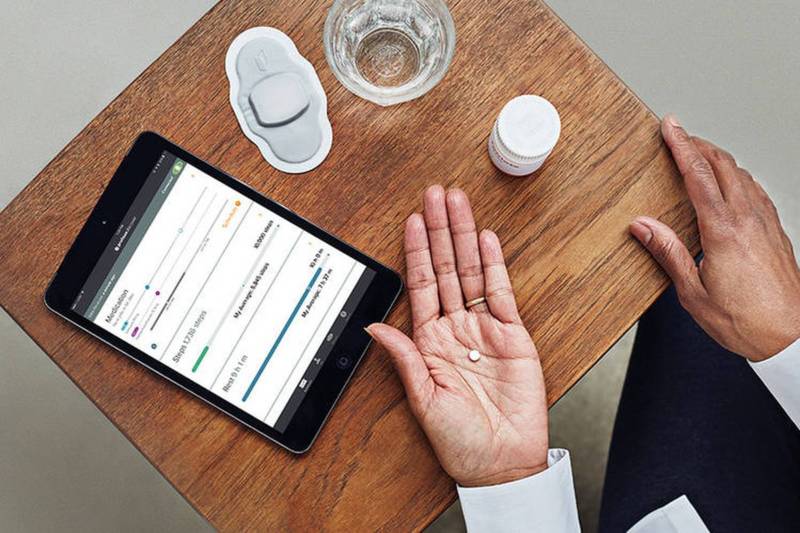Neither patients nor insurers are paying anything beyond the typical cost of the medication for Proteus’s high-tech upgrade. With the new digital chemotherapy pills, Proteus is only making money from the Minnesota health system, Fairview Health Services, where the patients receiving the medication are being treated.
Fairview, which like other health systems invests in phone calls and other reminders to patients to help them stay on track with their medications, is paying Proteus in the hope that it can save money if the technology can help its cancer patients do better.
Under the contract, Fairview will generally only pay Proteus if indicated cancer patients take their digital chemotherapy as prescribed 80 percent of the time, Proteus executives told reporters. For those patients who don’t meet that threshold, Proteus won’t get paid. With the unusual arrangement, Proteus joins a growing number of medical companies experimenting with payment structures tied to how well patients fare.
The commercial rollout of Abilify MyCite has gotten off to a slow start. It has yet to be prescribed outside of a clinical trial to a single patient, according to a spokesman for Otuska, the drug’s manufacturer. Otsuka late last summer announced plans to initially roll out the pill to certain patients covered by Medicaid.
The holdup: The managed care company that struck a deal with Otuska to roll out Abilify MyCite is still working with a health plan to get final approval so that physicians in its network can start offering the pills to patients, said the spokesman, Robert Murphy.
Proteus’s new digital chemotherapy offering combines two parts into a single capsule: The first is a medication known to scientists as capecitabine; it’s sold under the brand name Xeloda and generic equivalents. The second is the sensor, which Proteus manufactures and embeds into a placebo pill for easy handling; Proteus won FDA approval for the product in 2012. Proteus ships its sensor to a specialty pharmacy, where a pharmacist does the physical handiwork of putting the active medication and the sensor-within-a-placebo into one capsule.
Proteus picked capecitabine for its high-tech upgrade for a few reasons. For one, it’s a commonly prescribed chemotherapy pill used in a number of different cancers. It’s also a medication that doesn’t look likely to be threatened by any direct competitors or new entrants. And, crucially, it’s a challenging regimen for patients to stay adherent to; patients have to take six to eight pills each day, with two weeks on and one week off, to complete one of eight cycles of chemotherapy.
Abilify MyCite’s approval sparked concerns that vulnerable patients might be coerced into taking the drug, maybe through a court order or a deal offered in exchange for freedom, child custody, or a more lenient sentence. Critics also saw a risk to patient privacy, if a patient’s insurer or other companies peered in on a patient’s daily medication intake patterns and other data.
Dr. George Savage, Proteus’ chief medical officer, told reporters that the company is trying to preempt those concerns by working with bioethicists and keeping patients “in the driver’s seat.”
An experiment starting in Minnesota
Dr. Edward Greeno, an oncologist at the University of Minnesota who treats patients in the Fairview system, has led the rollout of the digital chemotherapy pills there. He said he’s been surprised by how enthusiastic patients have been so far.
Every time he and other clinicians have offered the treatment to appropriate patients, they’ve wanted to try it, he said. The only patients who haven’t gone through with it were those whose insurers wouldn’t allow them to fill their capecitabine prescriptions at Fairview’s specialty pharmacies, the only ones that can dispense the digital chemotherapy pills, Greeno said.
When patients have returned to the clinic after a few months of trying the digital chemotherapy pills, none has voiced complaints or worries, Greeno said. (Proteus has paid for some of Greeno’s travel.)
Greeno will be one of the researchers running a clinical trial that Proteus plans to launch to gauge whether patients taking digital chemotherapy see better clinical outcomes than those in the general population — and whether it saves money. The company plans to enroll 750 patients with different cancers at sites across the country, with the goal of launching eight trial sites this year.
The digital chemotherapy program is just one of about 40 approved medications that Proteus has packaged with a sensor in a capsule. The company has tried the technology with drugs for diabetes, hepatitis C, and tuberculosis, among others. Collectively, they’ve been used to treat thousands of patients, either commercially or in clinical trials, the company’s executives told reporters. In an unusual business model, none of Proteus’s revenue has come from insurers; instead, it’s made money from health systems and a development deal with Otuska.
Proteus also has big plans to turn itself into something of a high-tech generic drug manufacturer. It intends in the coming years to try to develop a generic version of capecitabine embedded with its sensor, like Abilify MyCite, and then seek FDA approval, the company’s executives said.
